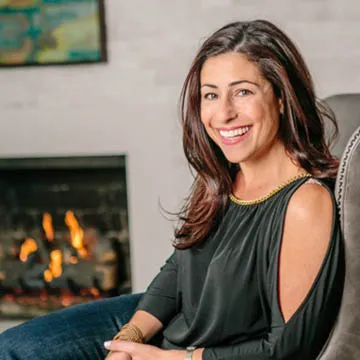Stage 3 Ovarian Cancer Survivor Helps Cancer Patients Cope with Lifeline

At the age of 27, my life was full of hopeful promises. I was working a fun job as a flight attendant traveling the word, and I was newly married and ready to start a family. When I started to experience vague pains in my abdomen, I reluctantly decided to go to my doctor. After an ultrasound, my doctor found a tumor in my left ovary. She assured me that it must be benign, telling me, “you’re far too young to have cancer.”
Under the impression that I would be back to work in a week, I scheduled the surgery to remove the “benign” tumor. I was anxious to have the minor health scare behind me; however, what would happen under the knife would change my life forever.
Ovarian Cancer Doesn’t Care How Old You Are
After a five-hour surgery, I woke up in indescribable pain. My doctor hovered over me in the recovery room informing me that I had cancer spread throughout my abdomen - Stage IIIc Ovarian Cancer - and that an emergency hysterectomy had been necessary. Without warning, my dreams of having children evaporated into thin air.
As my cancer battle forged beyond surgery into six months of chemotherapy, my marriage began to flounder. We were trying to get pregnant at the time of my diagnosis, and neither of us was prepared to deal with an infertility diagnosis. My husband ultimately decided he didn’t want to have children through adoption or surrogacy. Our marriage quickly imploded, and we divorced a year to the date of my diagnosis.
As my treatments ended and I adjusted into being a 28-year old divorcee, I found an inner strength and summoned the courage to recreate my life from the rubble. Being diagnosed with cancer shaped me into the person I am today. I developed the ability to bounce back, navigate unwelcome changes, and embrace new opportunities.
A Lifeline After Cancer
As a concerned friend of others facing cancer, I noticed how difficult it was for me to stay up-to-date with my friends’ treatments. My friends Leslie and Lori, both diagnosed with cancer very young, took different approaches to updating their loved ones. Leslie used the email approach, yet replies got lost in the shuffle.
Lori used a website that had all communication centralized in one place. I was inspired by this community of online support that revolved around Lori. Although Lori passed away after a two-year-long fight, her legacy lived on through her website. After she passed, I called Lori’s mother who told me, “that website was our lifeline.” This gave me the idea to create MyLifeLine.org as a nonprofit organization, so that every family impacted by cancer can experience the transformational impact of community and connection.
MyLifeLine became part of my emotional healing process. I wanted to create something that would pay it forward to help others just starting their journeys. Being diagnosed with cancer can be an isolating experience, but MyLifeLine offers patients a way to connect with their loved ones through a free, private personal webpage to keep family and friends informed about how they are doing and provides a Helping Calendar tool so that loved ones can provide practical support. Learn more about how MyLifeline can be a helpful resource for you and your family, because no patient should ever feel alone.
MyLifeLine, part of the Cancer Support Community, connects cancer patients and caregivers with their family and friends for social and emotional support. We provide a unique, web-based communication platform with free, cancer-specific resources and services to empower patients on their journey. To learn more and build your community, visit www.mylifeline.org